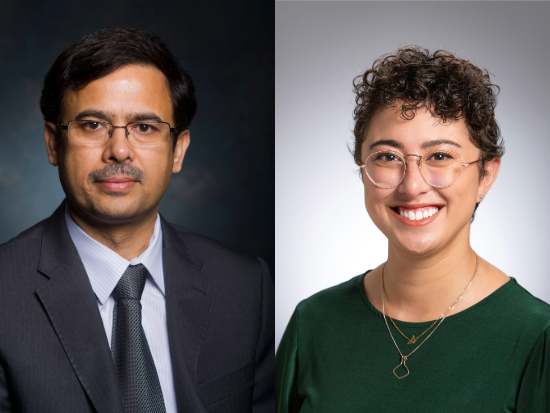 The Alabama Brain Collection (ABC), a cornerstone of groundbreaking postmortem brain tissue research since 2008, was founded by Rosalinda Roberts, Ph.D., professor emeritus in the UAB Department of Psychiatry and Behavioral Neurobiology. The ABC was established to collect and distribute high-quality, well-characterized human postmortem brain tissue for the research community.
The Alabama Brain Collection (ABC), a cornerstone of groundbreaking postmortem brain tissue research since 2008, was founded by Rosalinda Roberts, Ph.D., professor emeritus in the UAB Department of Psychiatry and Behavioral Neurobiology. The ABC was established to collect and distribute high-quality, well-characterized human postmortem brain tissue for the research community.
It is now led by Yogesh Dwivedi, Ph. D., Director and Distinguished Professor, and Elisabeth Ridgley, Endowed Chair, and Kirsten Schoonover, Ph. D., associate director and assistant professor, both within the Department of Psychiatry and Behavioral Neurobiology.
“The ABC is a unique resource for human postmortem brain tissue for investigators keen to understand the fundamental mechanisms associated with brain disorders, primarily psychiatric disorders,” Dwivedi said. “It also increases public awareness of the value of tissue donation for understanding brain disorders.”
Dwivedi and Schoonover delve into the specifics of the Alabama Brain Collection, highlighting its crucial role in advancing medical research.
What makes this collection important to medical research?
The ABC provides researchers with a wealth of resources, including medical records and clinical data sets, to facilitate their research. Examining postmortem brain tissue provides a unique opportunity to identify the neural substrate of psychiatric disorders, which cannot be studied in a living person. Also, human postmortem brain research often provides a useful basis for further investigation using other approaches. Understanding these illnesses better benefits patients by ensuring they receive more effective treatments in the future.
The ABC procures human brain tissues for major neuropsychiatric disorders, including but not limited to major depression, bipolar disorder, and schizophrenia. Additionally, the Brain Collection provides resources for tissue from psychiatrically ill patients who passed away by suicide.
Who can donate to the Alabama Brain Collection?
We accept donations from anyone aged 16-75, regardless of psychiatric or neurological background. Our work requires donations from those who are unaffected by these conditions so that we may make proper comparisons for the changes inflicted by disease.
What is the process for donating brain tissue to the Alabama Brain Collection?
To maintain our tissue quality standards, all donations must be collected within 24 hours of death. Therefore, it is great for donors to contact us ahead of time to set up their future donations, much like creating a will. Furthermore, next-of-kin should contact us as quickly as possible so that we may mobilize our team for timely collection. We understand this is an incredibly difficult and emotional time and aim to make the generous donation as seamless as possible.
What information should potential donors or their families be aware of before deciding to donate? Brain donation is an incredibly generous gift. Our team and the network of researchers it supports are deeply appreciative. Additionally, brain donation does not prevent an open-casket funeral, and the donation site remains unnoticeable during such ceremonies.
Although our donors are subject to a posthumous psychiatric autopsy to identify any conditions experienced during their lifetime, the ABC does not provide any potential diagnostic information to the families or next-of-kin. Furthermore, brain donations are not returned to the family. However, if at any point, the next-of-kin wishes to revoke their consent for utilizing their loved ones’ tissue, the tissue will be destroyed and no longer used.
How does the Collection ensure the privacy and confidentiality of donors?
All data collected will be highly confidential. Information obtained will be kept confidential to the extent allowed by law. However, research information that identifies donors may be shared with the UAB Institutional Review Board and others who are responsible for ensuring compliance with laws and regulations related to research, including people on behalf of UAB, the Department of Psychiatry, the Office for Human Research Protections, and the staff of the Alabama Brain Collection. The information from the research may be published for scientific purposes; however, the donor’s identity will never be given out. This consent form will be placed in a file along with other information and will be identified by a number without direct identifiers.
What are other ways to support the Alabama Brain Collection aside from brain donation?
Any help in spreading the word about this Brain collection and its mission among the community and researchers would be highly beneficial. Furthermore, financial contributions are welcomed, and details for giving are located on the ABC website.